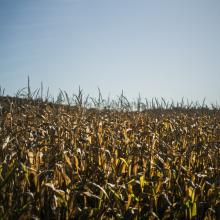Image set

Related services
Opening article section
Article section
Lead
Rich text
When it comes to recycling, everyone is familiar with the types of products that are thrown into blue bins and sorted into bags. But recycling is a concept that goes beyond plastic, paper, cardboard, and glass. As we join the conversation on Global Recycling Day, we can focus on another type of recycling: composting.
Englobe helps beautify our living environments by transforming organic waste produced by our communities, historically sent to the landfill, into compost. It is important to think again about what we throw away – seeing not waste, but opportunity. Where can we start? In our own kitchens by composting table scraps and food waste.
Rich text
Step 1
Food waste, like your banana peels and eggshells , represent the beginning of the composting cycle. Instead of throwing them into the trash, all your food scraps can be added into an appropriate composting bin. Unsure about what to put in your composting bin? Your local service supplier or municipality typically sends out a list of acceptable organic wastes to be composted. Rule of thumb: anything organic. No glass, metal or plastics.
Step 2
Like your household waste, your compost bin is typically collected by your service provider or municipality on a weekly or bi-weekly basis. Always ensure that your organic waste is placed in the proper collection bin to not inadvertently send them to the landfills.
Step 3
The organic collection truck gathers the organic waste and delivers it to a composting facility, like Englobe’s biomass center in Bury, Quebec. These composting facilities are specifically designed and permitted for municipal organic wastes such as food waste and leaf & yard organic matter.
Media
Rich text
Step 4
Upon arrival at the composting facility, your organic waste is blended into a perfectly mixed compost pile. Depending on the material to be composted, the facility will typically mix in added carbon (in the form of wood chips, bark or dry leaves) and moisture (water) to ensure a perfect blend of materials ideal for the micro-organisms who will ultimately breakdown and digest the organic matter.
Step 5
After several weeks (sometimes even months) of composting, the finished composts are then ready to be used again – in your home garden, to return to the land and help grow crops, etc. As we continually remove the essential nutrients from our soils, applying and re-using compost helps to enrich and improve soil health.
Media
Image set

Rich text
On Global Recycling day and every day, we want to encourage you to be a #RecyclingHero. Compost contributes to our planet’s well being and every action helps make a global difference.